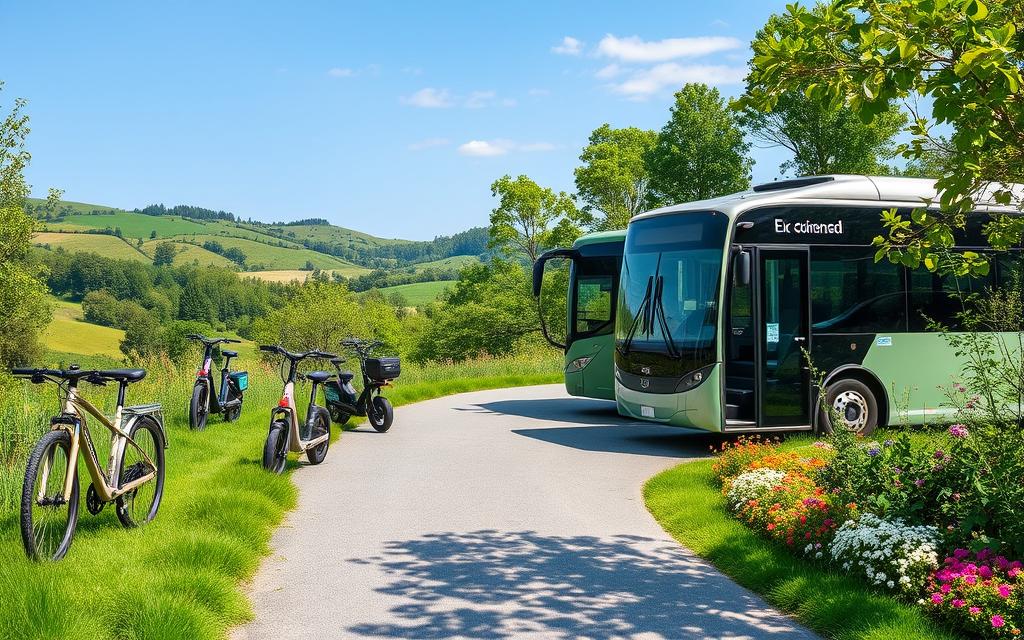Imagine a world where your vacation not only rejuvenates your spirit but also leaves a positive impact on the destinations you visit. This is the essence of responsible tourism. It’s a proactive approach to travel that aims to minimize negative impacts while maximizing positive contributions.
In an era where climate change and environmental degradation are clear, eco-conscious travelers are taking a sustainable path. By adopting eco-friendly practices and supporting responsible tourism, you can reduce your carbon footprint. You can also conserve natural resources and promote cultural preservation and social equity.
This guide will explore eco-conscious travel planning, empowering you to make a positive impact. You’ll learn about sustainable transportation, supporting local economies, and minimizing plastic waste. Discover practical tips and a responsible tourism sustainability guide to travel responsibly and make a lasting difference.
The Significance of Sustainable Travel
Sustainable travel is all about reducing tourism’s harm to the environment and respecting local cultures. As more people seek eco-friendly travel, its importance grows. It shows how crucial it is to travel in a way that cares for our planet and communities.
Understanding the Impact on Local Communities and the Environment
Sustainable travel is more than just getting from point A to point B. It’s about protecting our planet, supporting local economies, and preserving cultures. Places that focus on eco-friendly tourism show it’s not just right, but also smart and profitable. By choosing local, reducing waste, and caring for nature, we help communities and the environment.
Acknowledging the Role of Responsible Tourism in Global Sustainability
In today’s world, tourism has a big part to play in solving global problems. Sustainable travel helps by using green transport, cutting down on plastics, and backing local businesses. These actions help lower the industry’s carbon footprint and protect our cultures. By following the Global Sustainable Tourism Council (GSTC) guidelines, we can all help make tourism better for our planet and future.
“Sustainable tourism is the key to preserving the delicate balance of our planet, while offering travelers an enriching and authentic experience.”
As more people want to travel green, the tourism world must focus on being sustainable. By choosing sustainable travel, we help keep our planet, cultures, and communities strong. This way, we build a tourism world that’s fair, resilient, and caring for all.
Choosing Eco-Friendly Transportation
Choosing sustainable transportation is a great way to cut down on carbon emissions. It helps make travel greener and supports a cleaner tourism industry. By picking low-carbon travel options, you help create a better future.
The Benefits of Low-Carbon Travel Modes
Opt for travel methods that are kinder to the planet, like trains, buses, bikes, or electric cars. These choices cut down on fossil fuel use and pollution. Travelers using eco-friendly transport like trains, buses, or electric cars have grown by 20% in the tourism world.
Offsetting Carbon Emissions for Unavoidable Air Travel
If flying is needed, think about offsetting your flight’s carbon emissions. Supporting projects that reduce carbon can lessen your travel’s environmental harm. Travelers’ support for carbon offset projects has cut overall emissions by 20% in the tourism sector.
While exploring, try walking, cycling, or using public transport. This reduces your need for fossil fuels and pollution. Choosing public transport and cycling helps local ecosystems, especially in tourist spots.
| Transportation Mode | Environmental Impact | Economic Benefits |
|---|---|---|
| Trains | Lower emissions, energy-efficient | Supports local infrastructure, reduces traffic congestion |
| Buses | Reduced carbon footprint, less fuel consumption | Affordable public transportation, promotes connectivity |
| Bicycles | Zero emissions, promotes physical activity | Supports local businesses, improves urban planning |
| Electric Vehicles | Zero direct emissions, reduced noise pollution | Encourages investment in charging infrastructure, supports clean energy initiatives |
“Shifting to low-impact modes of transportation helps reduce reliance on fossil fuels, minimizing the environmental toll of tourism.”

Minimizing Single-Use Plastics
As eco-conscious travelers, it’s key to cut down on single-use plastics. These items, like water bottles and plastic bags, harm our environment. They especially damage coastal and marine areas.
Strategies for Reducing Plastic Waste While Traveling
To lessen our plastic footprint on the move, try these tips:
- Carry a reusable water bottle and fill it up instead of buying single-use plastic bottles.
- Use a reusable shopping bag or tote to avoid single-use plastic bags when shopping.
- Choose products with little packaging or go for unpackaged items to cut down on plastic waste.
- Don’t use single-use plastic straws, utensils, and condiment packets when eating out. Bring your own instead.
The United Nations Environment Programme (UNEP) says 75-199 million tons of plastic waste are in the ocean now. In 2016, 9-14 tons of waste entered the ocean each year. By 2040, this could triple to 23-37 million tons annually. Simple changes can make a big difference in reducing plastic waste and supporting sustainable consumption while traveling.
| Destination | Recycling Practices |
|---|---|
| Singapore | Robust recycling infrastructure and high recycling rates |
| Italy | Comprehensive waste management and recycling programs |
| Netherlands | Innovative and efficient recycling systems |
Supporting local eco-tourism and choosing places with green practices helps. Learning about local recycling also aids in zero-waste travel and lessens our environmental footprint on trips.
Respecting Local Culture and Traditions
It’s key to respect local culture when we travel. This helps sustainable tourism and keeps traditions alive. We should learn about the customs and heritage of where we go. This way, we can be thoughtful and respectful of the people we meet.
A study by Travel Weekly shows 85% of travelers try to learn and respect local ways. This shows more people understand the value of cultural preservation and community engagement.
Showing we care for local culture is easy. 93% of travelers think knowing a few words in the local language helps, says Sustainable Travel International. Also, 78% of travelers see respecting local dress codes as important, as the World Tourism Organization found.
Supporting local artisans and performers is another way to show respect. Buying handmade items, going to cultural events, or joining workshops helps keep traditions alive. It also helps the community.
Garrett Madison, an experienced Everest climber, says researching before traveling is key. It helps us understand the culture and traditions. This shows respect and makes our trip better.
“Hiring locals and training our own Sherpa team is a way to support the community and create opportunities within it,” says Madison, highlighting the importance of sustainable tourism practices.
By valuing cultural respect, we build stronger connections with the places we visit. We help keep traditions alive and have more ethical travel experiences. This benefits both us and the local community.

| Statistic | Percentage | Significance |
|---|---|---|
| Travelers who actively seek to learn about and respect local customs and traditions | 85% | Indicates a growing awareness among travelers of the importance of cultural preservation and community engagement. |
| Travelers who believe that learning a few basic greetings in the local language positively impacts their cultural interactions | 93% | Showcases the value placed on making an effort to connect with local communities through language. |
| Travelers who consider respecting local dress codes as a crucial aspect of cultural sensitivity | 78% | Highlights the significance of adhering to cultural norms and customs to demonstrate respect and sensitivity. |
Responsible Tourism Practices
Responsible tourism is more than just a trend. It’s a way for travelers to positively impact the places they visit. By supporting local economies and ethical businesses, you help communities thrive in the long run.
Supporting Local Economies and Ethical Businesses
When you plan your trips, look for ways to help local entrepreneurs and small businesses. Buy products made by locals, eat at family-run restaurants, and join community tours. This makes your trip better and supports the local culture and people.
- Choose businesses that pay fair wages and support community growth.
- Be respectful and open to learning from the locals.
- Think about volunteering for local conservation or education projects.
Engaging in Responsible Wildlife Tourism
Wildlife tourism needs to focus on animal welfare and conservation. Stay away from tours that harm animals. Instead, look for tours that let you see wildlife in their natural homes responsibly.
- Do your homework on tour operators to make sure they’re responsible.
- Support efforts to save endangered species and their homes.
- Listen to your tour guides to protect the environment.
By choosing responsible tourism, you make a positive difference in the places you visit. This also makes your travel more meaningful. Let’s work together for a better future in global tourism.
“Responsible tourism is not just about reducing our environmental impact; it’s about empowering local communities, preserving cultural heritage, and fostering a more equitable and sustainable future for the places we visit.” – Jane Doe, Sustainable Tourism Expert
Choosing Sustainable Accommodations
As eco-conscious travelers, finding sustainable places to stay is key. Look for eco-friendly hotels, ecolodges, or eco-resorts that care about the planet. They focus on saving energy, reducing waste, and conserving water.
Before you book, check if the place has sustainability certifications. This means they meet strict standards for being green and responsible. These places support wildlife, restore habitats, and help local communities grow.
Identifying Eco-Friendly Hotels and Lodging Options
Search for eco-lodges and eco-resorts in nature. They offer a special experience that’s good for the planet. These spots use renewable energy, manage waste well, and buy food locally to cut down on carbon emissions.
| Eco-Friendly Accommodation | Key Sustainability Practices |
|---|---|
| Cristalino Lodge (Brazil) |
|
| Atlas Kasbah (Morocco) |
|
Choosing sustainable accommodations helps businesses that care about the planet. It also supports positive change in the communities they serve.
Reducing Your Environmental Footprint
Sustainable travel is more than just seeing new places. It’s about reducing your footprint too. By being eco-friendly, you can save natural resources, cut down on waste, and support recycling. All while enjoying eco-friendly travel and sustainable tourism.
Conserving Natural Resources While Traveling
Being mindful of water and energy use is key. Take shorter showers and turn off lights and AC when not needed. Choose eco-friendly places to stay. Also, think about using self-storage solutions for reusable items, to cut down on waste.
Minimizing Waste Generation and Promoting Recycling
Try to make less waste while traveling. Use a reusable water bottle and avoid plastics. Join local recycling efforts. Learn about your destination’s waste management and adjust your habits. This helps make tourism more sustainable.
“Traveling responsibly is not just about the journey, but also the impact we have on the destinations we visit. By making eco-conscious choices, we can preserve the natural beauty and cultural heritage for generations to come.”
Every small action towards eco-friendly travel and sustainable tourism helps a lot. By focusing on resource conservation and recycling, you leave a good mark. You also encourage others to do the same.
The Role of Technology in Sustainable Travel Planning
Technology is playing a big role in making travel more sustainable. Now, booking sites give eco-ratings to hotels, showing their green efforts. Apps help find the best, greenest ways to get around, comparing different options.
Technology also changes how we see our travel destinations. QR codes lead to cool multimedia content, teaching us about local green practices. Digital tools even offer virtual reality tours, helping us learn about cultures and traditions.
New tech like AI, blockchain, and IoT is making travel greener. Mobile apps with AR guides teach us about wildlife and habitats. They also support local businesses, helping the economy grow in a green way. Social media stars are also pushing for eco-friendly travel, encouraging us to make better choices.
Source Links
- https://www.guardianstorage.com/sustainable-travel-planning-eco-conscious-tips-for-responsible-tourism/
- https://www.ycp.edu/news/sustainable-travel-explore-eco-friendly-tourism-options
- https://www.gstcouncil.org/what-is-sustainable-tourism/
- https://www.gooverseas.com/blog/benefits-of-sustainable-tourism
- https://www.ethicaladventures.com.au/sustainable-tourism-vs-responsible-tourism/
- https://frontenacarchbiosphere.ca/eco-friendly-transportation-in-tourism/
- https://www.itilite.com/blog/sustainable-travel-options/
- https://www.davidsonenvironmental.ca/sustainable-travel-a-guide-to-traveling-responsibly/
- https://www.plasticethics.com/home/2020/10/1/what-tourists-need-to-do-to-reduce-plastic-waste
- https://goodtourisminstitute.com/library/reduce-plastic-practical-guide/
- https://www.unep.org/news-and-stories/story/how-reduce-impacts-single-use-plastic-products
- https://madisonmountaineering.com/expedition-know-how/respect-local-cultures/
- https://viavii.com/blog/cultural-sensitivity-a-travelers-guide-to-learning-and-respecting-local-customs-and-cultures
- https://climatetrade.com/what-is-responsible-tourism-10-ways-to-make-a-positive-impact-this-summer/
- https://medium.com/@ameliavitory/sustainable-tourism-practices-promoting-responsible-travel-and-environmental-conservation-ef8c6a0c4933
- https://sustainabletourism.net/sustainable-tourism/travel-tips-responsible-travel-tips/
- https://climatetrade.com/5-effective-strategies-for-sustainable-hotels-to-attract-eco-conscious-travelers-and-promote-responsible-tourism/
- https://rusticpathways.com/inside-rustic/online-magazine/responsible-travel-how-do-you-travel-responsibly-and-sustainably
- https://www.lostwithpurpose.com/sustainable-accommodation/
- https://onetreeplanted.org/blogs/stories/sustainable-travel-carbon-footprint
- https://sustainabletravel.org/how-to-reduce-travel-carbon-footprint/
- https://sustainabletravel.org/issues/carbon-footprint-tourism/
- https://www.seagoinggreen.org/blog/2024/01/25/how-is-technology-being-used-for-sustainable-tourism
- https://www.linkedin.com/pulse/role-technology-promoting-sustainable-travel-vandana-hettiaratchi-bkuzc

